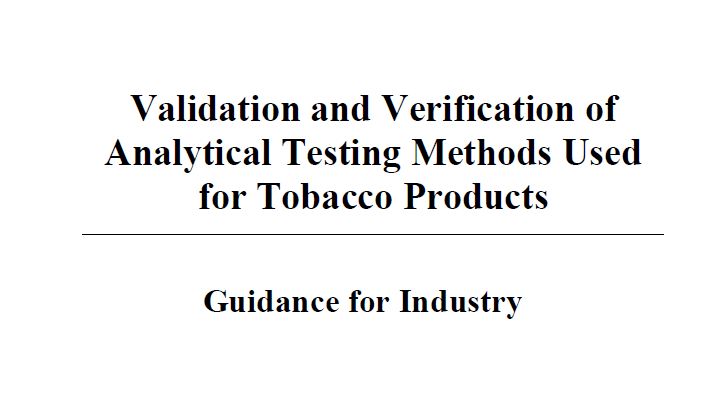The U.S. Food and Drug Administration’s (FDA) recently issued Final Guidance, Validation and Verification of Analytical Testing Methods Used for Tobacco Products, marks a significant milestone towards a more transparent and efficient framework for the tobacco industry, and tobacco product regulation. In finalizing this Guidance for the Industry, the FDA has provided standards for quantifying chemical constituents using analytical methods validated for critical parameters, including accuracy, precision, specificity, detection and quantitation limits, linearity, range, and total error. This Guidance will help ensure the reliability and consistency of data submitted in tobacco product regulatory applications such as Premarket Tobacco Product Applications (PMTAs), Modified Risk Tobacco Product Applications (MRTPAs)and Substantial Equivalence (SE).
Given the broad range of tobacco products and complexity of robust method development for tobacco-product matrices, McKinney Specialty Labs has a dedicated team specializing in validating analytical methods consistent with FDA’s Final Guidance and following the International Conference for Harmonization (ICH) guideline on the Validation of Analytical Procedures: Text and Methodology Q2 (R1) (ICH Guideline).
Here’s what you need to know and how we can help you navigate these changes.
Why Robust Analytical Testing Validation Matters
Analytical testing plays a crucial role in regulatory submissions by providing key data on tobacco product stability, harmful and potentially harmful constituents (HPHCs), ingredients, and additives. The FDA’s guidance emphasizes that validated and verified methods are essential to:
- Demonstrate the reliability and suitability of analytical methods.
- Ensure that testing results accurately represent the product.
- Facilitate the regulatory review process through scientifically valid data.
Key Components of the Guidance
1. Accredited Testing Facilities
The FDA recommends using nationally or internationally accredited laboratories, such as ISO 17025 accreditation, to instill confidence in the validity of test results. Proper documentation of laboratory accreditation must accompany submissions.
McKinney Specialty Labs’ Scope of Accreditation includes a wide range of analytes for Electronic Nicotine Delivery Systems (ENDS), Oral Nicotine Pouches, gums, and Heated Tobacco Products (HTPs) products. This breadth of capability ensures that our clients’ submissions are supported by validated methods tailored to the unique requirements of each product type.
2. Validation and Verification
- Validation ensures that analytical methods are suitable for their intended purposes, addressing critical parameters like accuracy, precision, specificity, detection and quantitation limits, linearity, and range.
- Verification confirms that a previously validated method remains applicable when applied to new products or under modified conditions. This process involves thorough evaluations, such as accuracy testing using spiked solutions and selectivity analysis to detect potential interferences.
3. Total Error Probability
A cornerstone of this guidance is the use of Total Error Probability to evaluate method reliability, integrating both accuracy and precision errors into one metric. This calculation is important to demonstrate the method is suitable for regulatory submission.
4. Robustness and Sampling Considerations
- Robustness testing identifies acceptable limits for instrument and method variations without compromising data accuracy.
- Sampling procedures require validation to mitigate the variability introduced by complex tobacco matrices and ensure representative results.
What This Means for the Industry
The FDA’s guidance provides a framework for harmonizing analytical testing across the tobacco industry. By adhering to these recommendations, manufacturers can:
- Enhance the reliability of their regulatory submissions.
- Reduce the likelihood of delays or rejections due to insufficient data.
- Demonstrate compliance with FDA’s rigorous standards for public health protection.
How McKinney Specialty Labs Can Support You
At McKinney Specialty Labs, we specialize in regulatory analytical and in vitro toxicology testing for the tobacco industry. Our team is uniquely equipped to:
- Develop and validate methods for analytical testing aligned with the FDA’s guidance.
- Ensure compliance with national and international laboratory standards, including ISO 17025 accreditation and GLP for toxicology testing.
- Provide data that meets the highest quality standards required by regulatory agencies, such as FDA, Medicines and Healthcare products Regulatory Agency (MHRA), Health Canada, ICH, etc.
-
Leverage our Tobacco Product Master File (TPMF) on file with the FDA to streamline regulatory submissions and provide additional confidence in the quality and reliability of our data.
Conclusion
The FDA’s guidance highlights the critical role of robust analytical testing in meeting regulatory requirements and protecting public health. At McKinney Specialty Labs, we are committed to providing our clients with scientifically rigorous solutions that meet the highest standards of data quality.
Contact us today to learn more about our services and how we can support your regulatory submission and compliance efforts.

